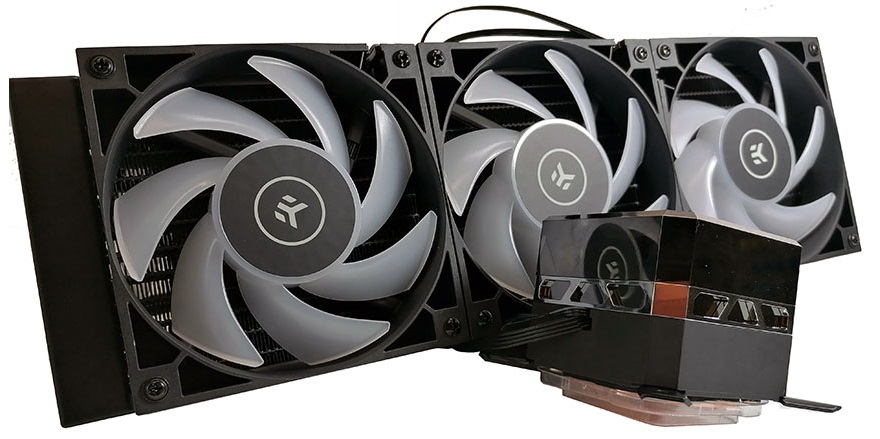EK AIO Elite 360 D-RGB CPU Cooler Review
Mike Sanders / 3 years ago
A Closer Look
As this is an AIO liquid cooler, there are clearly many individual aspects that go into the ready-to-rock product. However, out of the box, the initial impressions from the EK AIO Elite 360 D-RGB are excellent. You can almost instantly tell that this is a top-quality product with no expense seemingly spared in any aspect of its design. – Admittedly, coming with 6 D-RGB fans, this is a little intimidating when compared to what you might expect from a ‘usual’ 360mm AIO.
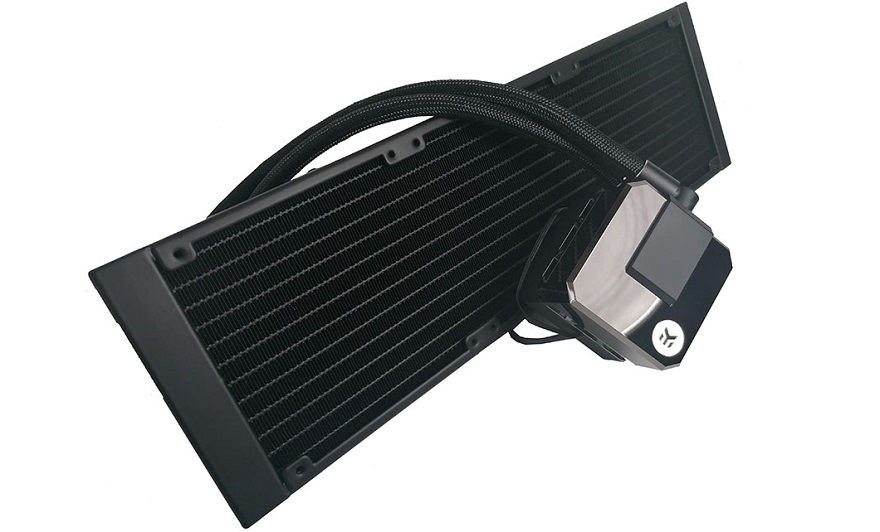
However, if this does seem a little more advanced for your current PC experience level, fret ye not! – There is definitely something about knowing that this is an EK product that tells me (and should hopefully tell you too) that despite it being a little more involved than usual, getting this hooked up should be a totally fine, if not pleasant experience.
With so much clearly going on with the EK AIO Elite 360 D-RGB, therefore, let’s take a closer look at some of the individual components that go into the overall design of this cooling solution.
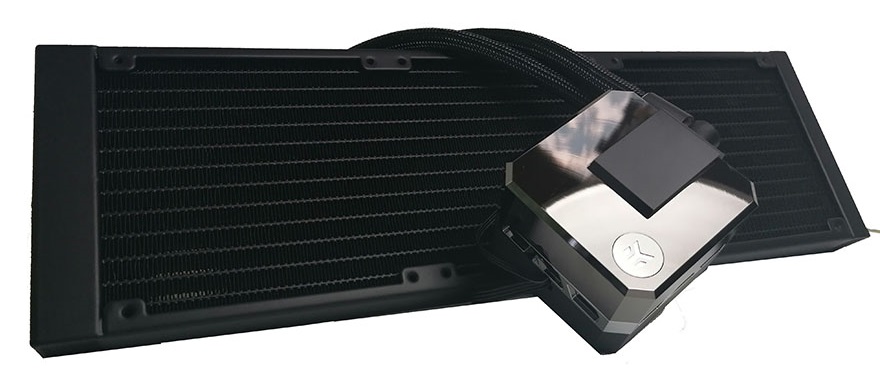
CPU Block
Coming in a squared shape, the EK AIO Elite 360 D-RGB CPU block is eye-catching with its highly reflective stainless steel surface and surround. With this off-set with some black aspects as part of its main design (such as where the hoses lead both in and out), it is, without a doubt, one of the aesthetically pleasing blocks I have seen.
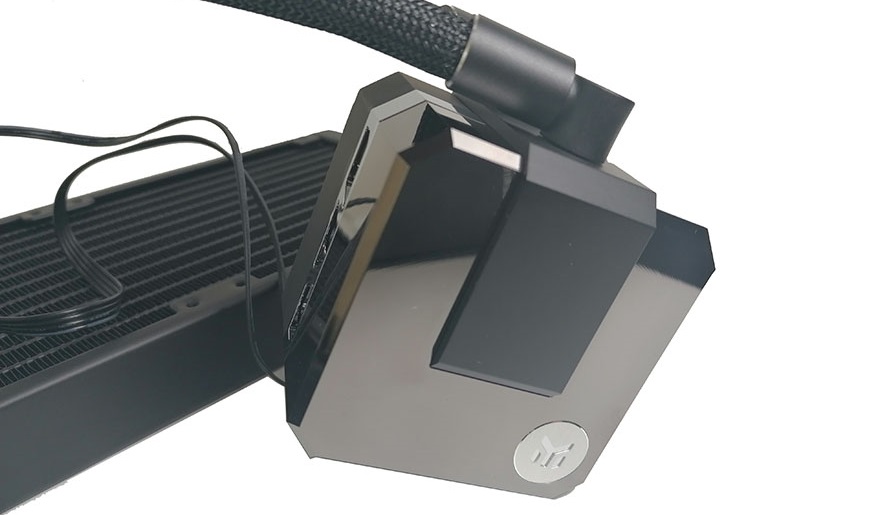
With some stylised sections to the outer rim and very attractive logo placement in the corner, I suspect that this is where some solid but subtle D-RGB action will appear when this is hooked up to our system. Overall though, the CPU block absolutely screams of a high-quality design, and I’m impressed with what they’ve done here.
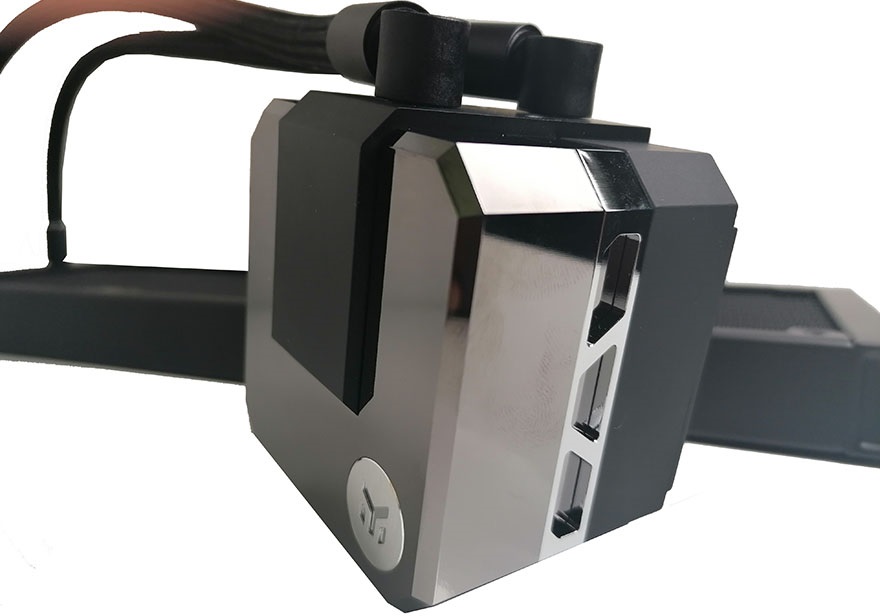
Contact Plate
Supporting practically every current and major consumer-level Intel and AMD socket design, the contact plate is huge and comes with a supremely polished copper finish. Better still, for those of you a little nervous about thermal paste application, a neatly applied portion comes ready for you out of the box (Albeit this was removed before our testing for consistent testing).
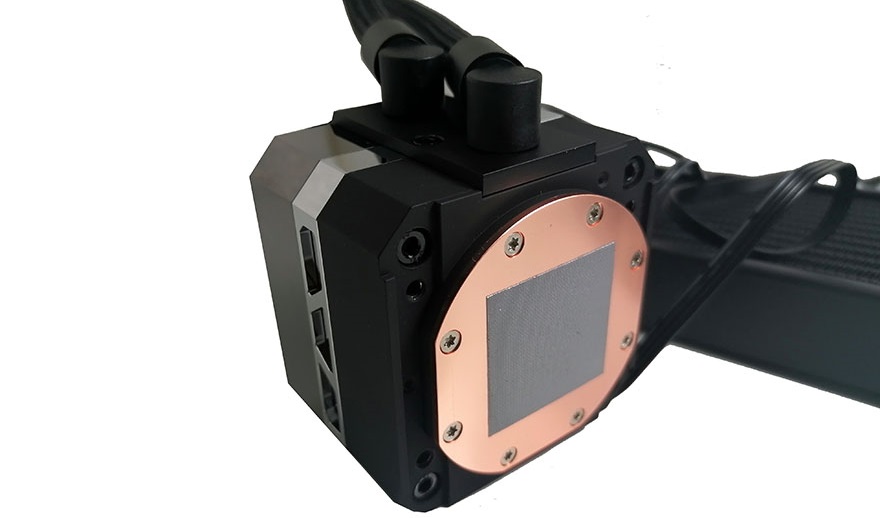
Radiator
In terms of the radiator, on the whole, it appears fairly standard and exactly what you would expect to see from a 360mm design. It is a little disappointing that there is no apparent branding visible on it, but this is made up for when the fans are installed. More so, given that this will be sandwiched between 6 fans; Did it really need to be anything special? We don’t think so.
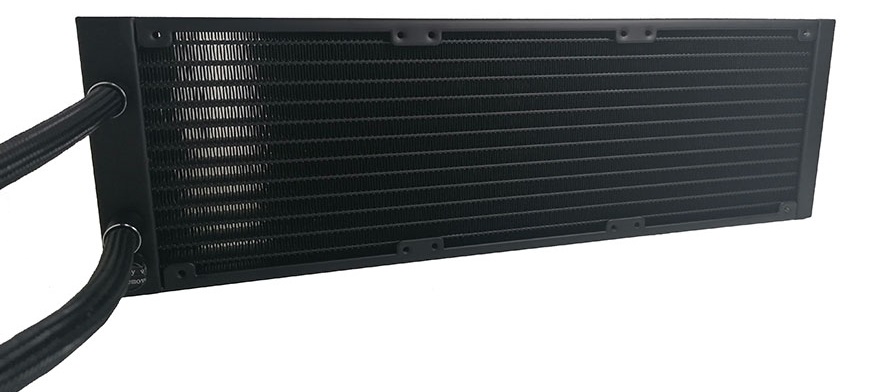
The fins to the radiator are exceptionally tightly packed while still allowing plenty of room for airflow. Admittedly, when they’re this tight, then some maintenance will always be necessary in the future to ensure any dust deposits are removed. We do, however, suspect that over a 6-12 month period, being effectively sat between two fans, it could be necessary to clean it more often than you might usually expect.
In something that is definitely a huge help in the design aspect, though, to accommodate for the slightly chunkier width of the AIO Elite 360 D-RGB, EK has made the hoses around 2″ longer than you usually expect to find. Something that should have no impact for the vast majority of installations while making it massively easier for those with more spacious cases or have greater distances where they intend to mount this (such as if you were to install this to the front of a mid-tower chassis).
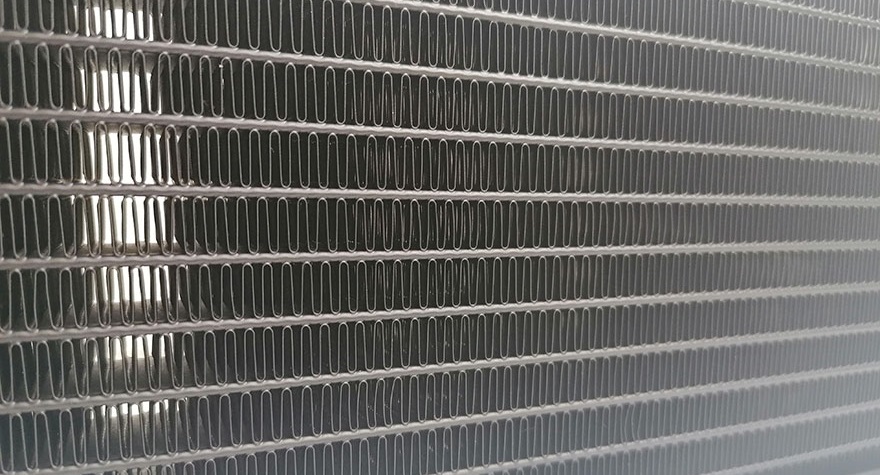
Fans
One of the key things that distinguish the EK AIO Elite 360 D-RGB from your ‘average’ 360mm AIO is the fact that (and yes, we know we’ve already mentioned this more than a few times) this model comes with six D-ARGB fans. Offering speeds of up to 3,300RPM (offering 66.04 CFM), these definitely fall within the remit of high-end designs. Although they look rather generic in terms of their design, we fully expect an impressive light show from these once they’re hooked up to our system.
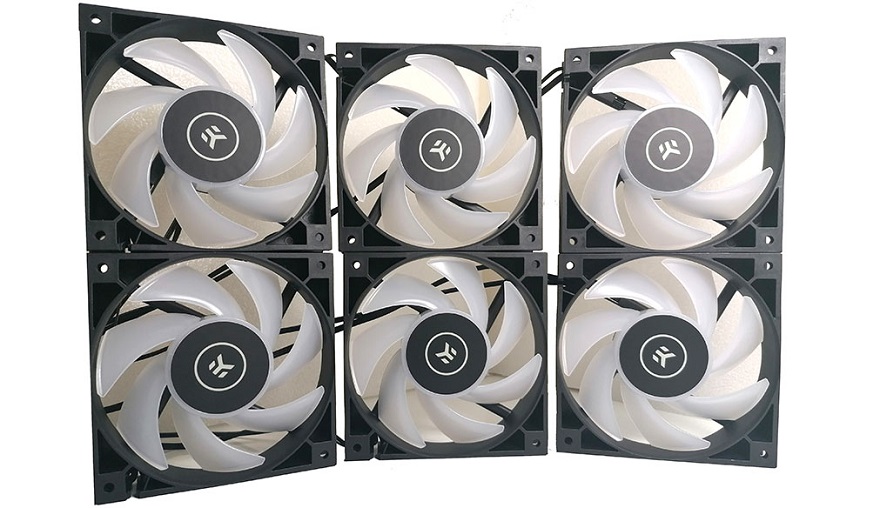
A closer look reveals them to be ‘Vardar S’ models, which EK has designed. This is a factor that indicates that they consider these to be an excellent accompaniment to the AIO design and overall cooling performance.
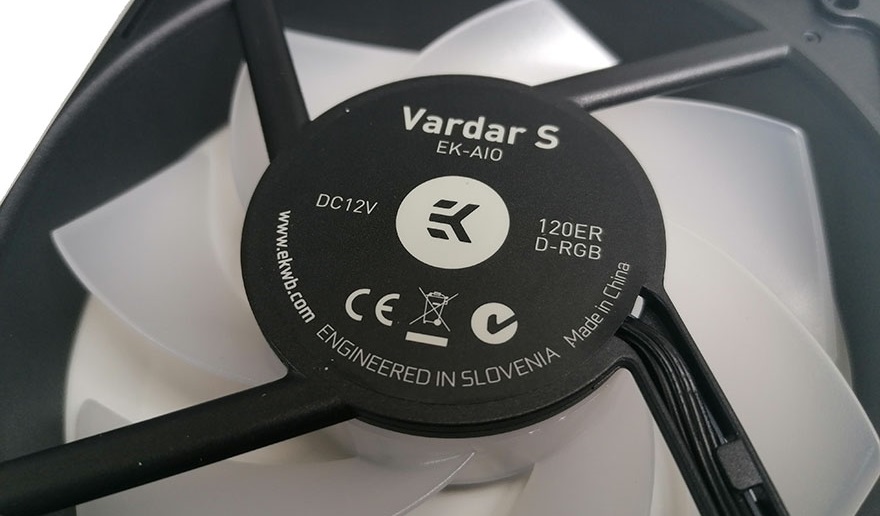
The only mild fly in the ointment with these fans is that each one comes with a full-length PWM and D-ARGB cable. While the latter gives you the option to ‘daisy chain’ the lighting, the cables remain on each fan at around 10″ in length. So, with 6 fans, that’s 12 very long cables to attempt to manage and route, and that’s not even counting the two attached to the pump head. Therefore, it suggests that these fans, while still an EK product (which is good), were not specifically designed or created for this cooler.
If they were, then I can’t help but feel that shorter cables allowing for a direct ‘daisy chain’ hook-up method would’ve been significantly easier for users in terms of cable management. To me, this is a mistake or oversight that while not a major problem, could have so easily been improved upon with the only notable loss being less individual fan control in the D-ARGB software settings.
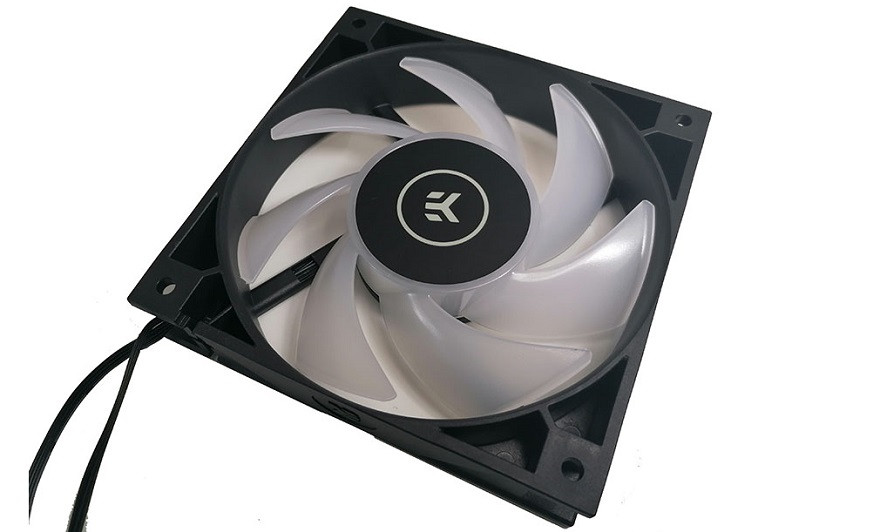
Overall
When fully assembled and sat pending fitting to a system, we’re not going to lie, the masses of cables you have is more than a little scary. Admittedly, I’ve been somewhat diplomatic in my pictures below, but if I hadn’t been, well… the only words I can use to describe it is ‘rats nest’.
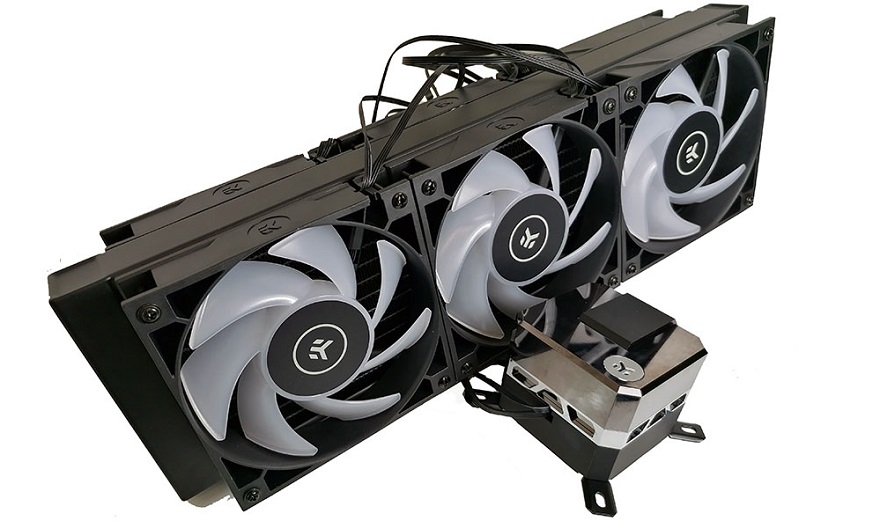
As a complete package, though, and putting those masses of cables to one side (both metaphorically and literally speaking), the EK AIO Elite 360 D-RGB looks absolutely fantastic even before the D-RGB lights have had a chance to shine. While EK branding is there, it’s subtle and eye-catching enough to really accentuate just how much thought and care went into its design and presentation.
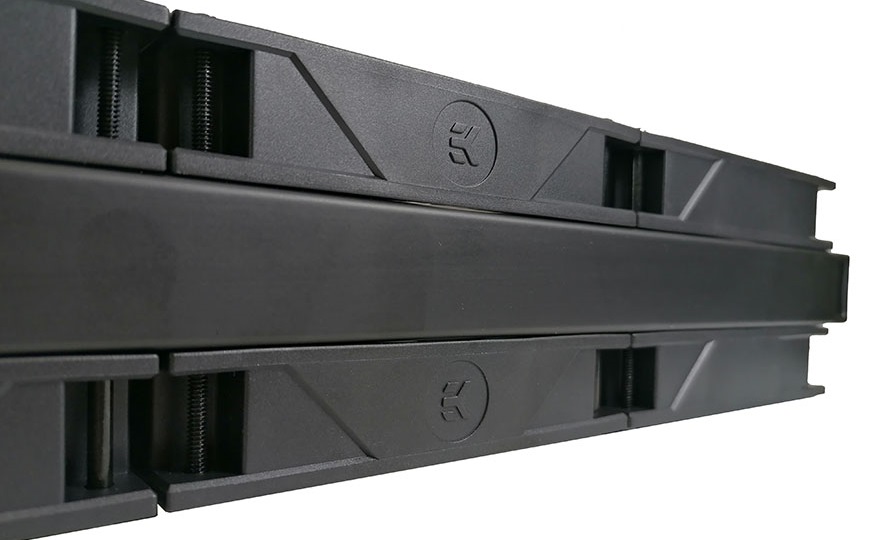
So, while looking like an exceptionally strong and very well designed cooler, is this going to be a mess to install in your system with all those cables? Well, there’s only one way to find out. Let’s get this fitted and see just how good, or bad, the experience is. And more so, what this should be like in terms of cable management.
